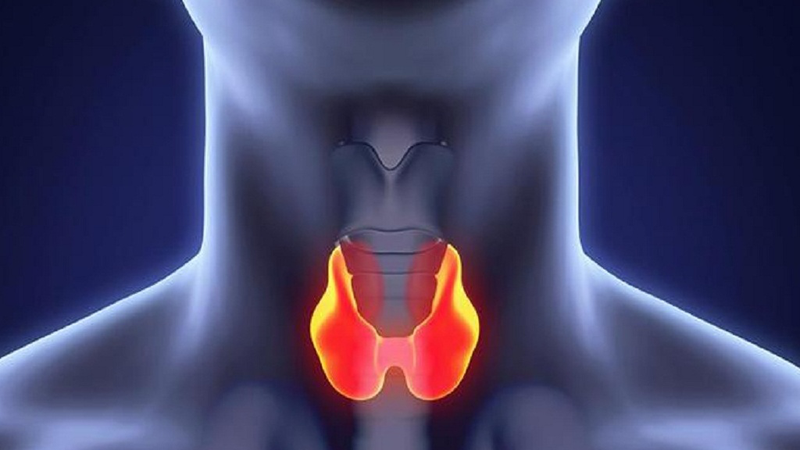According to some statistics, about 3-4% of pregnant women have thyroid dysfunction. Thyroid dysfunction during pregnancy can affect the health of both mother and fetus if not treated promptly. Follow the article below to learn more about this issue!
What is thyroid disorder?
The thyroid is an important endocrine gland located in the anterior neck region, playing an important role in the body’s metabolism through two hormones T3 (tri-iodo-thyronine), T4 (Thyroxine).

The thyroid is an endocrine gland that plays an important role in the body’s metabolism.
Thyroid disorders are diseases that affect the function of the thyroid gland, including:
- Hypothyroidism: This is a condition in which the thyroid gland cannot produce enough hormones needed by the body, meaning that the concentration of T3 and T4 in the blood is too low. Hypothyroidism can be caused by the thyroid gland itself or by problems related to the pituitary gland and hypothalamus.
- Hyperthyroidism: In contrast to hypothyroidism, hyperthyroidism is a condition in which the thyroid gland produces too many hormones, causing metabolic disorders. Compared to hypothyroidism, hyperthyroidism is less common.
- Goiter: This is a condition in which the thyroid gland is abnormally enlarged. This is not a specific disease, it can be caused by hyperthyroidism, iodine deficiency, pregnancy, or malignant tumors.
- Thyroid cancer: This is a dangerous disease, commonly found in adult women. For the most part, if the disease is detected early, the survival and recovery rate in patients with thyroid cancer is quite high.
- Thyroid nodules: These are abnormal growths inside the thyroid gland, which can be caused by thyroid cysts, thyroid cancer or goiter.
Causes of thyroid disorders during pregnancy
Recent reports show that about 3-4% of pregnant women experience thyroid disorders. The most common cause of thyroid disorders during pregnancy is Hashimoto’s disease. This is an autoimmune disease. Women can have this disease before pregnancy or during their first pregnancy. Then, the disease will become more severe during pregnancy.

The most common cause of thyroid disorders during pregnancy is Hashimoto’s disease.
In addition, thyroid disorders during pregnancy can also be caused by other factors such as:
- Iodine deficiency, iodine intake or intake is too low compared to the body’s needs.
- Iodine consumption is too high.
- Have been treated with radioactive iodine.
- Use of certain drugs that affect thyroid function such as drugs to treat Basedow’s disease.
- Hyperthyroidism, goiter, thyroid nodules, etc.
- Thyroidectomy.
In addition, there are some factors that can increase the risk of thyroid disorders such as:
- Having had thyroid disorders in previous pregnancies.
- Suffering from certain metabolic diseases such as type 1 diabetes, pituitary dysfunction, hypothalamus, etc.
- Having had a miscarriage, premature birth, fetal malformation, etc.
- Being treated for hypothyroidism.
- Suffering from autoimmune diseases such as systemic lupus erythematosus, rheumatoid arthritis, etc.
- Family history of relatives with thyroid diseases.
Therefore, people with the above risk factors should be screened for thyroid-related problems before pregnancy. Usually, the doctor will recommend a blood test to determine the levels of TSH, T3, T4 hormones to assess the function and activity of the thyroid gland.

Before pregnancy, people with risk factors for thyroid disease should have screening tests.
Is thyroid disorder during pregnancy dangerous for the fetus?
According to experts, this condition can affect the health of both mother and fetus. During the first 10 weeks of pregnancy, the fetus is not fully developed, the body does not have a thyroid gland, so it needs to depend on the mother’s thyroid hormone through the placenta.
This is an important period, the organs are forming and developing, so if the fetus is deficient in hormones, it can lead to birth defects, stillbirth or the child may be born with intellectual disabilities,… However, depending on the type of hormone deficiency and the level of deficiency, the fetus will be affected to different degrees.

Thyroid disorders during pregnancy can affect the health of both mother and fetus.
In women with thyroid disorders during pregnancy due to hypothyroidism, the mother may encounter some problems such as high blood pressure, miscarriage, premature birth, etc. As for hyperthyroidism, although it accounts for a smaller proportion, it can cause some dangerous complications such as premature birth, eclampsia, preeclampsia, and even threaten the lives of both mother and fetus.
In short, thyroid disorders during pregnancy are abnormal conditions that can affect the health of both mother and fetus. Therefore, screening for thyroid-related abnormalities before pregnancy is very important. Early detection of the disease will help prevent dangerous complications in both mother and child. Hopefully the information in this article will be useful to you.





